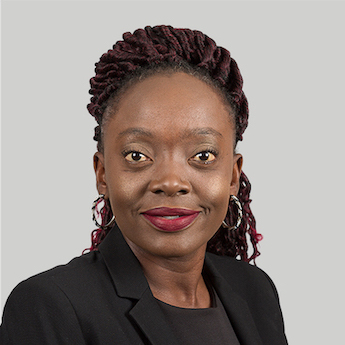Women have historically been shut out of decision-making roles in the finance industry, and South Africa is no exception. In 2023, just 17.2% of portfolio management professionals in South Africa were women. Tsitsi Hatendi-Matika (MBA 2014) was one of the lucky few. In 2013, she landed a dream role as the head of fixed income and fixed income portfolio manager at Afena Capital in Cape Town. She’d worked hard to get there, even completing a Master’s in Finance in London, but she felt limited by her specialised role.
“I was getting frustrated when I had questions around strategy and where the business was going, and in general about our sector,” she says. “The thing that excited me was strategic thinking.” She knew she would need generalist training to break out of this box, so in 2016, she turned to the MBA at the University of Cape Town’s Graduate School of Business. But even Tsitsi didn’t anticipate how much the MBA would help her blaze a trail for other South African women of colour in finance.
“The MBA created a golden thread through my career”
Once she enrolled in the UCT GSB MBA, Tsitsi was surprised by how rapidly she was able to expand her skillset. The MBA at UCT offers core courses on numerous topics within three key subject areas, all of which target the high-level strategy that excited Tsitsi:
- Business and leadership in global contexts
- Managing complex environments
- Strategic decision-making in changing environments
Alongside this training, feedback from students and professors helped her sharpen her thinking and act decisively, making quick decisions that were backed by evidence. “The MBA really connected the dots and created a golden thread through my career,” she says. “It allowed me to see the pathways I could take to utilise my strengths and be more generalist in my thinking.” These are effects that she still feels today. “I started thinking of life in case studies,” she laughs. “In those two years, I was constantly being fed information – it was like being a supercharged individual who’s constantly a thinking machine.”
“On the MBA, I didn’t feel like a minority”
In addition to broadening her skillset, Tsitsi hoped the MBA would help her build a network in her region. The inclusive nature of the program meant this happened fast. “Being in financial services and having been in very technical roles, I was used to being the only female or female of color in the room,” she says. “Inclusion was lacking in my circle of interaction at the time. “But on the MBA, I didn’t feel like a minority. It’s nice to walk into a room where that’s not an issue – it gives you the ability to focus on what matters.” This inclusive atmosphere fostered authentic connections not only with her classmates but with students in other programs and peer groups besides her own. She even amassed an international network, thanks to the global crop of students at the business school.
“It’s made me an inclusion warrior”
The impact of expanding her strategic thinking in an inclusive, learning environment had a profound effect on Tsitsi’s career. Firstly, it enabled her to explore opportunities outside her specialised niche. Tsitsi took on roles as a portfolio manager at Old Mutual Investment Group, head retail investment specialist at Barclays Africa, and head of marketing and investment communications at Absa Group before arriving in her current position as client director at Ninety One. As well as giving her the power to see the bigger picture within her organisation, it also inspired her to apply her strategic mindset and big-picture thinking outside her current role.
“It’s made me an inclusion warrior,” she says. “I’m constantly aware that there are young people coming into the industry and I don’t want them to feel how I felt. I’m always looking for opportunities to make the environment more inclusive.”
“I wanted to be part of something greater”
Tsitsi’s efforts to increase inclusion in her sector are multiple. She is an active member of Ninety One’s “Inspire” program, supporting affinity groups within the organisation. These groups promote community between underrepresented employees, for instance, by facilitating conversations about fertility in the workplace.
Outside her organisation, Tsitsi focuses her inclusion efforts on young entrants to the industry, as she feels this is where she can make the most impact. “Representation matters,” Tsitsi says. “If someone can see someone who looks like them [succeeding], that helps them to feel like it can be done.” She works with students at UCT, delivering confidence workshops and trying to inspire young students, especially female students, to pursue financial services careers.
She has also given talks to the Actuaries in the Making program, which brings together actuarial students from multiple universities and has participated in the CFA Society’s Pink Book initiative, showcasing the careers of women in financial services.
This ability to think strategically about solving the problems of her industry, and not just her clients or workplace, comes from the MBA. “I wanted to be part of something that could be greater than just the company I work for,” she says. “Before the MBA, my thinking would be more siloed – I would think of what I could do [with my current employer]. Now, I think much bigger.”
This Alumni profile originally appeared on BusinessBecause.com.
























































































































